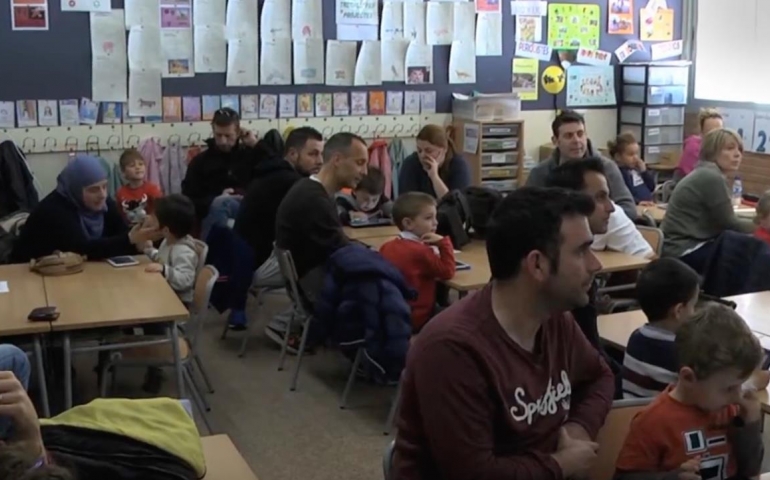On Board with Education Innovation Network (EIN)
On Board is about creating a culture in public education that prioritises innovation, empowers teachers, families and students working together with research institutions, business sectors and other local entities. EIN explores innovative practices modernising education curricula also through digital technologies at different ages and stages of learning, to provide pupils with the necessary skills to enter the job market.
Educational Innovation Network (EIN) I was born in 2013 in Volladecans to rethink and update the existing education system involving public administration officials, education centres & professionals, families and enterprises to foster educational innovation. EIN carries out various projects in which the establishments of collaboration agreements among local school-enterprises-families is key to innovate. Examples are:
• Collaboration agreement between enterprises, schools and the city council dedicated to senior students of the Upper Secondary School or Vocational Training to solve problems and issues suggested by local enterprises, with the scope of improving the accessibility in the job markets of the young generation.
• Collaboration with research institutions such as the university of Barcelona to tackle “Emotional Education”, in which specific training is given to teachers to develop emotional competences (of teachers and pupils) in school contexts.
• Collaboration with families encouraged to join EIN by participating in the school council, collaborating on reading happenings or festivities, taking part in the AFS Association of Families of Students of the local schools supported by Expert of the education department.
From a technological point of view, the EIN carries out several projects, in order to ensure that Viladecans’ schools, teachers and students are provided with digital devices and skills.
One of the main achievement for the sustainability of the project is the political commitment signed by all the ON board partner cities to sustain the EIN approach. The ULG gave an impetus in this sense through the creation of the “Drivers Group” of the EIN, which intends to support beyond the ON BOARD project to help ensuring the network’s long-lasting involvement and contributions to education innovation in Viladecans. Moreover, Viladecans is going one step further with the new strategy it announced recently called 360º Education, under the 360º Education Alliance, which Viladecans joined in 2019. This initiative, promoted by the Barcelona Regional Council, Federation of Pedagogical Renovation Movements of Catalonia (FMRPC) and the Jaume Bofill Foundation, brings together town councils and local bodies, educational centres, associations and free-time organisations, and the voluntary sector. To shape the strategy, a multidisciplinary Steering Group has been set up, with primary and secondary school teachers, youth and sports groups, family associations, the Psycho-Pedagogical Advisory Team, the Barcelona Regional Council and the Viladecans City Council Department of Sport and Education. 360º Education will kick off with a pilot project with organisations that work with children to help them manage their emotions in line with what educational centres do and to ensure continuity of learning at school and outside of school.The 360º Education project will complement the Educational Innovation Network and help foster the educational success of children in the city.
The EIN good practice is entirely designed around the concept of participation, more specifically on the creation of multistakeholders’ partnership from different sectors. In Villadecans the implementation of most of the EIN project is composed of circa 850 members (primary and secondary schools, education professionals, families and enterprises).. All primary and secondary schools in the city are voluntarily involved in more than one project out of the 10 active network projects.
ON BOARD project has given in Viladecans the time and space to reflect at themunicipal level what has worked and what hasn’t, involving teachers, families, businesses, youths and civil society entities. Thus, the creation of ON BOARD network meant the opportunity to consolidate the EIN approach labelled URBACT good Practice. The main difference for Vlladecans concerns the improvement of the EIN modus operandi, which throught the Transfer has been improved along three axes concerning : 1) the inclusion of Civil Society, SME entities and young people as active members of the network; 2) the definition of a clear set of indicators to measure and evaluate the results and impact and help us to take decisions for the future; and, 3) the ensuring the sustainability of the EIN in the future. As network the cities signed jointly a political declaration
The EIN good practice lays on the creation of a strong multistakehodelr network, which in Villadecas constitute now a stable ecosystem of different people created over a relatively long period of time. The complexity of the transfer was indeed in providing the tools for the creation of an healthy and context-dependent stakeholders’ ecosystem able to sustain the creation of the innovative educational approach. The methodology adopted for the On Board six participating European cities (Viladecans, Halmstad, Nantes, Albergaria, Tallinn, and Poznan) was to organise 8 transnational meetings, focusing on key partners as the teachers and their role in the promotion of educational innovation and their capacity to open the school and interact with local agents; The business and university sector and their capacity to dialogue with schools, The non-formal education organisations and other local cultural, sports and leisure entities and associations, Students families. In terms of statistics the Transfer network involved more than 600 teachers, 5 400 students, 120 families, 19 companies and 24 entities, 15 pilot projects. The disruption of COVID has been heartily felt in this Transfer Network.

